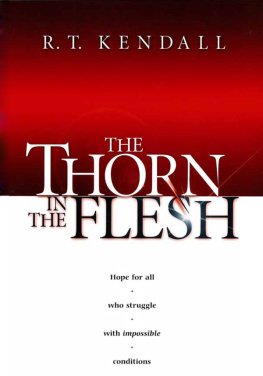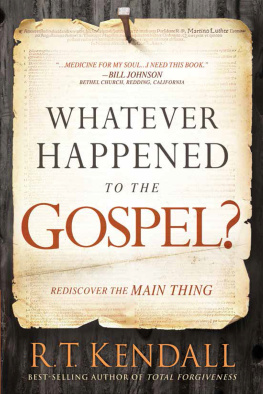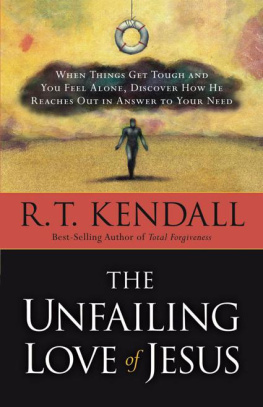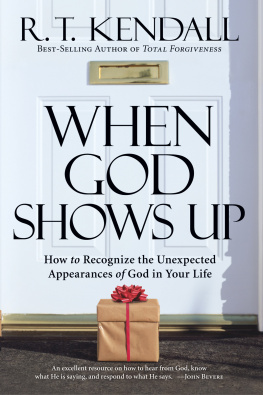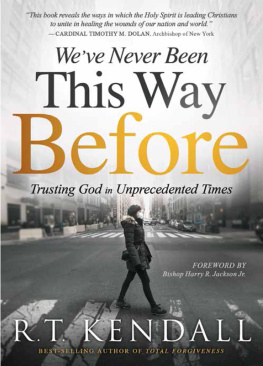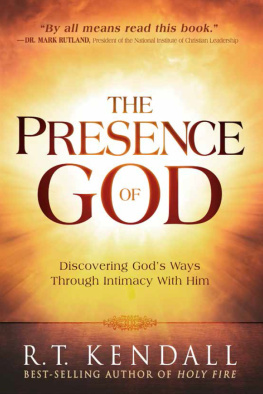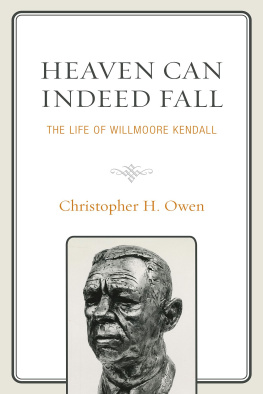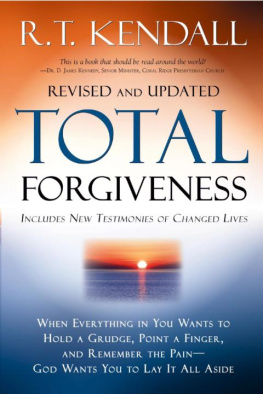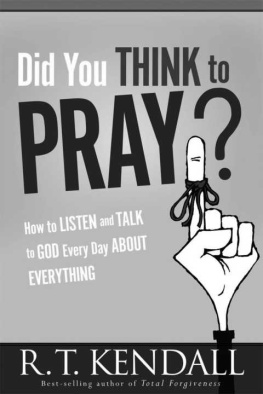
Contents
W hile we may seek to live life to the full, enjoying every day that God gives, thebreakthroughs in our Christian walk seldom come when things are going smoothly. Godseems to choose our dark timesthe problems, difficulties, pains, temptations, andsuffering we experienceto draw us closer to Him and deeper in our personal pilgrimage.
RT, writing with insights drawn from many years of ministry and his own testimony,speaks to those laboring under trials and tribulations of many kinds, helping usto recognize the hand of God and then to find how He wants us to respond. It is theextraordinary message of The Thorn in the Flesh that the very situations that causeus most anguish can, when seen in the light of Christ, become treasured memoriesand landmarks.
As I read this book, I was able to identify afresh where God has been reaching outto me in my places of weakness and strain. Then I found my humble afflictions weredignified by His immeasurable grace, and I was equipped afresh to pray and respondappropriately.
I have known RT for many years, and because of our close friendship, I have beenprivileged to know something of the thorn in his flesh. His attitude to it has beenmoving and deeply challenging to me personally. I know of no one better qualifiedto write on this deeply profound subject.
REV. LYNDON BOWRING
EXECUTIVE CHAIRMAN, CARE
OF GREAT BRITAIN
I have been fascinated with the concept of thorn in the flesh for a long time.A few years ago, one Sunday morning before the service, I found myself almost agonizingbefore the LordWhy is this? I pleaded. I then turned to my regular Bible readingplan (one that was designed by Robert Murray MCheynethe Scottish preacher of thelast century) and found myself reading 2 Corinthians 12. Like golden letters leapingout at me, 2 Corinthians 12:7 read:
To keep me from becoming conceited because of these surpassingly great revelations,there was given me a thorn in my flesh, a messenger of Satan, to torment me.
I knew this was the explanation to a dilemma that I myself had faced for many, manyyears. As I say in the introduction, I have decided not to tell what my thorn inthe flesh is. But it was of no small comfort to discover that what had plagued mefor so long is best understood as that.
I express the hope that the reader may have a similar breakthrough. I hope alsothat my chapter headings will cover most eventualities, although I am sure thereare many, many more options as to what ones thorn in the flesh could be.
I want to thank Annabel Robson at Hodder and Stoughton for her help again. This wasone of the last books she edited before moving on from Hodders. My heartfelt thanksalso go to Jenny Ross, who typed the original manuscript. My secretary Sheila Pentonhad the continued task of finishing the manuscriptfor which I am grateful. I havea host of friends who have read the manuscript, and some of them have kindly givenendorsements. I want to thank Lyndon Bowring for his foreword and for the valuablesuggestions given to me by his friend Geoff Ridsdale. I also want to thank LillianMcAnally for the editing she has done on the American edition of my book.
I have dedicated this book to Rob and Di Parsons. They have been precious friendsfor a good number of years, and they also have their thornwhich is mentioned inthis book. They may be surprised that I have dedicated this book to them, but theyshouldnt be!
R. T. KENDALL
KEY LARGO, FLORIDA
WWW.RTKENDALLMINISTRIES.COM
I n my book The Anointing: Yesterday, Today, Tomorrow, I endeavored to show thatevery person has an anointing. That is good news indeed, but it doesnt end there:God may want to increase our anointing. The sobering news is that He may choose todo this by way of a thorn in the flesh. This will get our attention and is designedto keep us humble. It has the effect not only of protecting our anointing, but alsoof increasing it.
John Newton (17251807) is probably best known for his hymn Amazing Grace. It wasjust one more hymn to him, for he tried to write a new one every week. He would probablybe surprised to learn that Amazing Grace is the one that people sing most today.He wrote another hymn, I Asked the Lord, one that is hardly known today, but itfits with this book. I understand why it is not very popular, and I cant say itis my favorite. And yet it describes me perfectly. It reads:
I asked the Lord that I might grow
In faith, and love, and every grace,
Might more of His salvation know,
And seek more earnestly His face.
Twas He who taught me thus to pray,
And He, I trust, has answered prayer;
But it has been in such a way
As almost drove me to despair.
I hope that in some favored hour
At once Hed answer my request;
And, by His loves constraining power,
Subdue my sins, and give me rest.
Instead of this, He made me feel
The hidden evils of my heart,
And let the angry powers of hell
Assault my soul in every part.
Yea, more, with His own hand He seemed
Intent to aggravate my woe,
Crossed all the fair designs I schemed,
Blasted my gourds, and laid me low.
Lord, why is this? I trembling cried,
Wilt Thou pursue Thy worm to death?
Tis in this way, the Lord replied,
I answer prayer for grace and faith.
These inward trials I employ,
From self and pride to set thee free,
And break thy schemes of earthly joy,
That thou mayest seek thy all in Me.
Of course, it has been impossible for me to write this book without considering myown thorn in the flesh. I have one in particular, but to be honest there are othersas well. It was wise of God the Holy Spirit to withhold from us the identity of Paulsthorn in the flesh, for this enables each of us to enter into the experience. Andwithout trying to elevate myself to Pauls level, I have decided to do the same.Save for this: you should know that it hurts more than you will ever know, is withme day and night, and sometimes, I have felt, is more than I can endure. Over andover, I have cried out to God to be released from it.
In over forty years of ministry I have met some unusual people. I have probably learnedas much from conversations with them as I have from reading books and hearing sermons.One of the most stunning comments I ever heard, almost a throwaway remark, came fromone of the most famous ministers in the world. He said to me, RT, the more Goduses me, the less I am able to enjoy it.
This is the last thing we want to hear, and maybe it is incomprehensible to some,but I am sorry to have to tell you that I know exactly what he meant by that. Godhas many ways of ensuring that while we enjoy His blessing, we do not become conceited.But in my view, His most powerful way of guaranteeing that blessing is the subjectof this bookthe thorn in the flesh.
I admit that the apostle Paul is a hero for many of us, but I have to face the factthat he too was open to pride and to taking himself too seriously. But God had aplan; Paul was too precious to be allowed to fall into that kind of folly. And soGod acted; this is how Paul describes what God decided to do: To keep me from becomingconceited because of these surpassingly great revelations, there was given me athorn in my flesh, a messenger of Satan, to torment me (2 Cor. 12:7).
Think hard before you pray for a greater anointing. You too may well end up saying,The more God uses me, the less I am able to enjoy it.
To be honest, though, I must add that there is a singular kindness attached to suchan affliction. So too with yours; it is Gods hint to you that He is not finishedwith you yet. If you ask me, there is no sweeter thought than the sheer consciousnessof God refining me to a greater anointing for His glory. This causes me to hold mythorn close to me, almost to embrace it and say, Lord, I would still prefer thatYou take it away, but not until it has fulfilled all the purposes for which You allowedit. I dare pray no other way. And as we begin this study together, I humbly askGod that by the end of this book, no matter how severe your test or how bruisingyour thorn is, my prayer will be yours as well.
Next page
